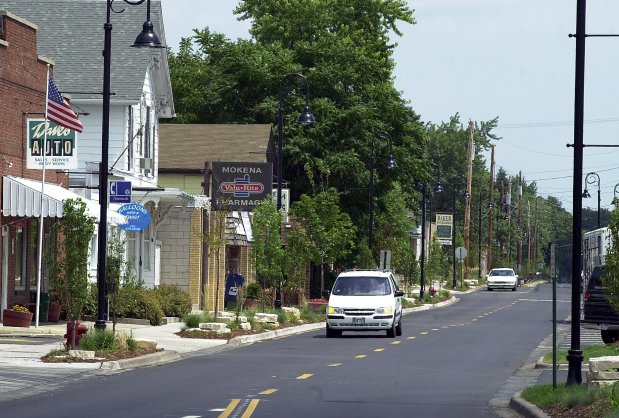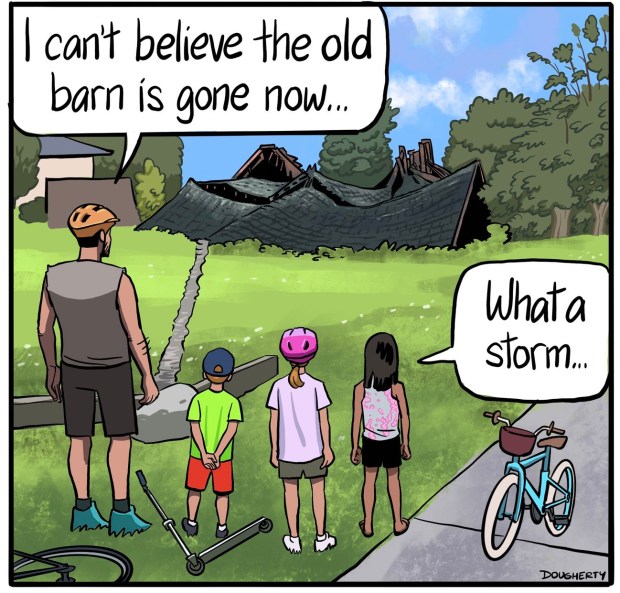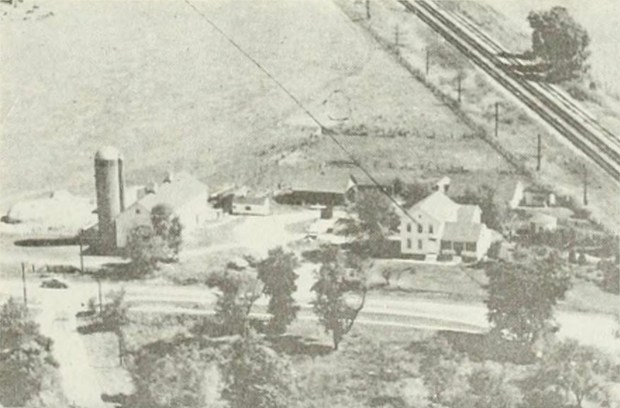The landscape around Mokena was rapidly transforming when Matt Galik was growing up there in the 1990s.
“Mokena was one big construction zone with all the subdivisions going in,” he said.
Always a railroad town, it was milk that put the place on the map going back to the 1800s. Dairy farms dotted the landscape for over a century.
By 2000, Edwin Yunker’s cattle herd crossing Laporte Road had stopped traffic for the last time, leaving few reminders of the village’s agricultural past amid a booming suburban population.
Galik had cataloged three landmarks in Mokena with direct ties to its bovine roots before a derecho swept through the Chicago area July 15, along with tornadoes and widespread damage reports. After winds reported by the National Weather Service’s Chicago office tore through town at 90 mph, one of those landmarks, an old dairy barn along Schoolhouse Road, was reduced to a pile of old growth lumber.
“It’s a big loss for the community,” Galik said. “It’s the loss of a tangible link to our past, our cultural heritage.”
Galik is a lifelong Mokena resident whose enthusiasm for researching his village’s roots turned into two books about local history, along with an unofficial title.
“People call me the Mokena historian and I’ve kind of taken to it,” he said, noting the town’s official historical society hasn’t met since the onset of the pandemic.
He wrote a newspaper column on Mokena history for 11 years until the publication abruptly ceased in 2020, and has maintained a local history blog at oldmokena.blogspot.com in the years since.
Much like the barn, Galik was “crushed after the storm.” The red dairy barn along Schoolhouse Road was built around 1910, he said, by John and Josephine Erickson, Swedish immigrants who had bought property in the mostly German town in 1905 and quickly ingrained themselves in the Mokena community.
While the Ericksons were “pillars” of the wider Swedish community, holding church services in the farmhouse that still stands on the property, they also devoted part of their land as a gathering spot for the entire town.
“Baseball for a very long time in Mokena was a very big deal, going back into the 1880s,” he said. Not long after building their dairy barn, the Ericksons set aside land just to the north for a large baseball field, Galik said, where the home team competed against squads from as far away as Chicago.
“In the modern sense, you could call it semi-pro in that they managed to get players from other places to come and play for the local team,” he said. “At one point they were planning on building bleachers out there, but I don’t know if that ever came to pass.”
Erickson Field, sometimes called Erickson Park, entered local lore as a gathering spot throughout the 1910s, at least until World War I tapped the pool of young men available to play and spectate.
Part of the Erickson Field’s prominence might have come from its location across the road from Mokena School — the school of Schoolhouse Road. Belying the road’s humble connotation, the two-story frame structure was touted as being among the finest education facilities in Will County, according to a village timeline compiled by the Mokena Area Historical Society in 2010.
“It was a big building with lots of windows,” Galik said. “There was a bell tower.”
But in 1929, an even larger, better school was erected on Carpenter Street and amid the Great Depression, the Schoolhouse Road school building was dismantled, board by board, by its new owners, a carpenter and his brother-in-law, the village milkman.
Several Mokena houses, including four on Midland Avenue, are said to have been built “partially out of schoolhouse wood,” said Galik, who lives in one of them.
“Some of the floor boards and beams in the basement — you can tell they definitely came from somewhere else,” he said. “They weren’t new when they were used to build our house in the ’30s. You can tell things were nailed to them at some point, and there are burn marks on some of them.”
Impossible to independently verify, Galik said his claim also is based on “word from a couple of Mokena old timers — which is very valuable to me — who told me they’re pretty sure the house was built out of the old schoolhouse wood.”

Back across the street, the Ericksons were getting on in age by the 1930s and passed the farm down to their daughter, Mabel, and her husband, Elmer Benson, a fellow Swede who learned the land as the Ericksons’ longtime farmhand. The Bensons’ dairy operation lasted into the 1970s, but they were better known for the Halloween treats they’d distribute to Mokena kids each October.
“The Benson farmhouse was a must-stop place, they would hand out ice cream bars and taffy apples,” Galik said.
Like the bulk of Mokena’s farmlands, the 100-plus acres surrounding the house and barn eventually gave way to modern suburbia. The site of Erickson Field became a cul-de-sac, 1st Court.
But kids still paid attention to the old Erickson/Benson barn.
Dan Dougherty, who moved to Mokena in 2021, said the barn’s destruction this month affected his whole family.
“The kids were really sad about it too,” he said. “It was very much talked about, how this cool barn is something that’s no longer here to look at.”
Even as a relative newcomer to Mokena, the landmark had left an impression.
“That barn felt like a connection to a different time,” Doughterty said. “It’s a shame to see something like that go.”
A fixture along the route of his daily run, Dougherty said he “jumped on his bike and headed over” the morning after the derecho.
“There’s no way they can salvage that, in my opinion,” he said. “It’s too far gone.”

So Dougherty memorialized the barn in his own way, through a panel in the “Beardo” comic strip he’s created for decades, including for a time in the 2000s for the Daily Southtown. These days it’s distributed at gocomics.com as well as his website, Beardocomics.com.
“I rarely do something that’s locked into a moment in time,” he said. “But I felt like it deserved to be remembered by something, even if it’s just a comic strip.”
As of Wednesday, the wreckage of the old barn remained just as it fell, but Galik hopes its lumber, seasoned by over a century of Mokena weather, will be salvaged and reused.
As with the Schoolhouse Road school, perhaps decades from now some future Mokena historian will try to discern if a house, or piece of furniture, contains vestiges of the village’s collective heritage that was knocked down by a historic storm.
Landmarks is a column by Paul Eisenberg exploring the people, places and things that have left an indelible mark on the Southland. He can be reached at peisenberg@tribpub.com.





